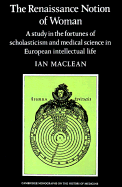 The Renaissance Notion of Woman
The Renaissance Notion of Woman Summary
5.1.1 The primary focus of this investigation is on commentaries connected with academic disiplines; of these law is among the most wide ranging. No attempt is made here to survey systematically this vast field of study; such an undertaking is far beyond the limited scope of this enquiry. Nor will there be any systematic attempt to relate the theoretical status of woman to that which she actually enjoyed. Much work remains to be done in this area, although there exists a useful collection of essays, published under the auspices of the Société Jean Bodin in 1959 and 1962. It is hoped nonetheless that the inter disciplinary nature of the notion of woman and its ramifications in law will emerge from the very brief survey undertaken here.
5.1.2 Nearly all faculties of law on the continent of Europe in the later Middle Ages and Renaissance concern themselves with Civil and Canon Law. The great medieval Italian school is strongly influential from the fourteenth century onwards; it is associated with the names of Accursius, Bartolus and Baldus. Its method – the ‘mos italicus’ – led less to philological accuracy or historical truth than to an unhistorical interrelationship of all manner of law, and to a use of the interpretative methods of contemporary theology. This method was succeeded – although not eradicated – by the ‘mos gallicus’, which has its origins in Italy in the work of Lorenzo Valla (c. 1406–57), but is developed in France by Guillaume Budé (1468–1540), Andrea Alciato (1492–1550) and their pupils.
- Type
- Chapter
- Information
- The Renaissance Notion of WomanA Study in the Fortunes of Scholasticism and Medical Science in European Intellectual Life, pp. 68 - 81Publisher: Cambridge University PressPrint publication year: 1980
